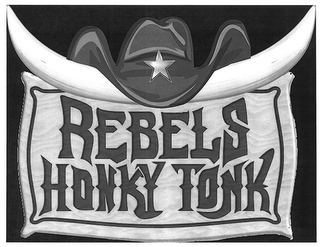Here’s a a short and sweet one. Two guys, Mohammad Jarrah and Justin Truesdell, had some kind of business relationship—Jarrah claims Truesdell was an employee and Truesdell claimed he and Jarrah were partners. Whatever it was, the relationship ended.
Jarrah then opened an establishment in Houston called “Rebels Honky Tonk” in August, 2009.

Then Truesdell opened a “Rebels Honky Tonk” in Austin in September, 2009 and a “Rebels Honky Tonk” in Oak Ridge North, Texas in March, 2012. He also registered the REBELS HONKY TONK trademark, the same logo the Jarrah was using:

The parties cross-claimed on likelihood of confusion, so the only question is—who owns the mark?
These are all the facts the court needed to decide the claims on a motion for judgment on the pleadings:
Ownership of a mark is established by use in the market, not by registration. As stated in a leading treatise,
Neither application for, nor registration of, a mark at the federal level wipes out the prior nonregistered, common law rights of others. The nonregistered rights of a senior user continue and are not trumped by the later federal registration of a junior user. The “senior user” who first uses the mark in the marketplace “is entitled to enjoin other ‘junior’ users from using the mark, or one that is deceptively similar to it.”
Defendants do not dispute that Plaintiffs opened Rebels Honky Tonk Houston in August 2009. Defendants’ own pleadings state that Truesdell did not open Rebels Honky Tonk Austin until November 2009. Rebels Honky Tonk Oak Ridge was then opened in March 2012. By Defendants’ own allegations, therefore, Plaintiffs have ownership of Plaintiffs’ Marks by virtue of their priority of use in the market. Truesdell’s registration of his Mark does not establish ownership.
Truesdell’s claim that he developed the name, logo and concept while in the business relationship with Jarrah doesn’t matter, at least for a trademark infringement claim.
Reservoir, Inc. v. Truesdell, No. 4:12-2756 (S.D. Tex. April 30, 2013).

Leave a Reply